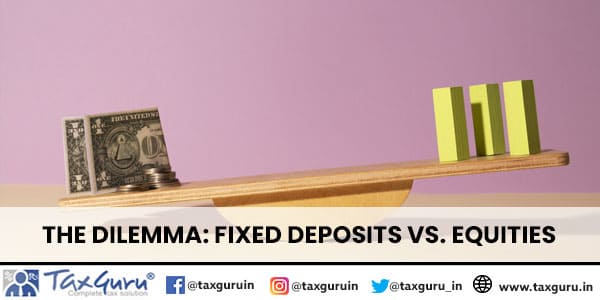Introduction: As fixed deposit rates reach unprecedented levels, investors face the dilemma of choosing between fixed deposits and equities for their investment portfolio. While fixed deposits offer stability, equities promise higher returns. However, one often overlooked aspect in this decision-making process is the impact of taxes.
Fixed deposit rates have soared to unprecedented levels, currently ranging between 7% and 8%. Now, the question arises: where should one allocate their funds, in fixed deposits or equities? An often overlooked aspect in this decision-making process is the impact of taxes.
Understanding Fixed Deposits
Fixed deposits, often considered a safe haven for investment, offer fixed returns over a predetermined period. They are subject to taxation at the standard income tax rates. For instance, if you fall under a higher tax slab with a rate of 30%, your effective yield after tax would be 4.90% (7% * 0.70).
Taxation of Fixed Deposits
The interest earned on fixed deposits is added to your total income and taxed according to your income tax slab. This means higher tax slabs result in lower effective returns from fixed deposits.
Exploring Equities
Investing in equities involves purchasing shares of publicly traded companies, which can offer potentially higher returns but also carry higher risk. Unlike fixed deposits, the taxation of equity investments varies based on the holding period and type of gains.

Long-term Capital Gains
Long-term capital gains from equities enjoy an exemption on the first 1 lakh, with any surplus being taxed at 10%. This provides a favorable tax treatment for long-term investors.
Short-term Capital Gains
Short-term capital gains, on the other hand, incur a tax rate of 15%. This applies to gains from equities sold within a period of fewer than two years.
Factors Influencing the Decision
Deciding between fixed deposits and equities requires considering various factors, including risk tolerance, investment horizon, and tax implications.
Risk Tolerance
Investing in equities entails greater risk compared to fixed deposits. While fixed deposits offer guaranteed returns, equities are subject to market fluctuations and company performance.
Investment Horizon
The investment horizon, or the length of time you plan to hold your investments, plays a crucial role. Fixed deposits are suitable for short-term goals or preserving capital, while equities are better suited for long-term wealth accumulation due to their potential for higher returns over time.
Tax Implications
Understanding the tax implications of each investment option is essential for maximizing returns. While fixed deposits are taxed at standard income tax rates, equities offer preferential tax treatment for long-term gains.
Making an Informed Decision
To make an informed decision between fixed deposits and equities, it’s crucial to evaluate your financial goals, risk tolerance, and tax considerations.
Assessing Financial Goals
Consider your short-term and long-term financial goals. If you have short-term goals or need a stable source of income, fixed deposits may be more suitable. For long-term wealth accumulation and beating inflation, equities offer higher growth potential.
Evaluating Risk Tolerance
Assess your risk tolerance and investment temperament. If you’re a conservative investor who prioritizes capital preservation, fixed deposits may align better with your risk tolerance. However, if you’re comfortable with market volatility and seeking higher returns, equities could be more appealing.
Understanding Tax Considerations
Understand the tax implications of each investment option and how they align with your overall tax planning strategy. Consider consulting with a tax advisor to optimize your investment portfolio from a tax perspective.
Conclusion
The decision between fixed deposits and equities depends on various factors, including risk tolerance, investment horizon, and tax implications. While fixed deposits offer stability and guaranteed returns, equities provide the potential for higher growth over the long term. Understanding your financial goals and risk profile is crucial in making the right investment decision. Additionally, considering the tax implications can further enhance your overall investment decisions.





